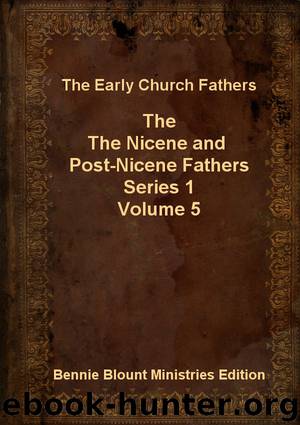Nicene and Post-Nicene Fathers Series 1 Volume 5 by Early Church Fathers

Author:Early Church Fathers [Fathers, Early Church]
Language: eng
Format: epub
Tags: Early Church Fathers
Publisher: Bennie Blount Ministries
Published: 0101-01-01T00:00:00+00:00
Accordingly the apostle also, speaking apparently with this passage in view, declares: "But this I say, brethren, the time is short: it remaineth, that both they that have wives be as though they had them not; and they that weep, as though they wept not; and they that rejoice, as though they rejoiced not; and they that buy, as though they possessed not; and they that use this world, as though they used it not: for the fashion of this world passeth away. But I would have you without solicitude."53 This entire passage (that I may express my view on this subject in the shape of a brief exposition of the apostle's words) I think must be understood as follows: "This I say, brethren, the time is short." No longer is God's people to be propagated by carnal generation; but, henceforth, it is to be gathered out by spiritual regeneration. "It remaineth, therefore, that they that have wives" be not subject to carnal concupiscence; "and they that weep," under the sadness of present evil, should rejoice in the hope of future blessing; "and they that rejoice," over any temporary advantage, should fear the eternal judgment; "and they that buy," should so hold their possessions as not to cleave to them by overmuch love; "and they that use this world" should reflect that it is passing away, and does not remain. "For the fashion of this world passeth away: but," he says, "I would have you to be without solicitude,"-in other words: I would have you lift up your heart, that it may dwell among those things which do not pass away. He then goes on to say: "He that is unmarried careth for the things that belong to the Lord, how he may please the Lord: but he that is married careth for the things that are of the world, how he may please his wife."54 And thus to some extent he explains what he had already said: "Let them that have wives be asthough they had none." For they who have wives in such a way as to care for the things of the Lord, how they may please the Lord, without having any care for the things of the world in order to please their wives, are, in fact, just as if they had no wives. And this is effected with greater ease when the wives, too, are of such a disposition, because they please their husbands not merely because they are rich, because they are high in rank, noble in race, and amiable in natural temper, but because they are believers, because they are religious, because they are chaste, because they are good men.
Chapter 16 [XIV.]-A Certain Degree of Intemperance is to Be Tolerated in the Case of Married Persons; The Use of Matrimony for the Mere Pleasure of Lust is Not Without Sin, But Because of the Nuptial Relation the Sin is Venial.
Download
This site does not store any files on its server. We only index and link to content provided by other sites. Please contact the content providers to delete copyright contents if any and email us, we'll remove relevant links or contents immediately.
The Gnostic Gospels by Pagels Elaine(2522)
Jesus by Paul Johnson(2351)
Devil, The by Almond Philip C(2324)
The Nativity by Geza Vermes(2226)
The Psychedelic Gospels: The Secret History of Hallucinogens in Christianity by Jerry B. Brown(2148)
Forensics by Val McDermid(2087)
Going Clear: Scientology, Hollywood, and the Prison of Belief by Lawrence Wright(1974)
Going Clear by Lawrence Wright(1962)
Barking to the Choir by Gregory Boyle(1817)
Old Testament History by John H. Sailhamer(1807)
Augustine: Conversions to Confessions by Robin Lane Fox(1765)
The Early Centuries - Byzantium 01 by John Julius Norwich(1730)
A Prophet with Honor by William C. Martin(1717)
A History of the Franks by Gregory of Tours(1712)
Dark Mysteries of the Vatican by H. Paul Jeffers(1704)
The Bible Doesn't Say That by Dr. Joel M. Hoffman(1676)
by Christianity & Islam(1627)
The First Crusade by Thomas Asbridge(1600)
The Amish by Steven M. Nolt(1561)
